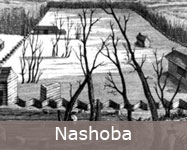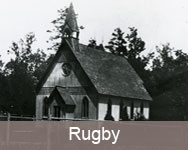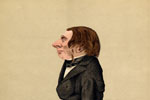
Caricature of John Ruskin, from Vanity Fair, 1897 |
John Ruskin
“It is … as an observer of politics … that Mr. Ruskin is perhaps the most remarkably in antagonism with the current Englishman. He sees in the universal desire to make money … the great and fatal evil of the times, and rebels entirely against all the complex social and political arrangements which have been constituted into a system to that end. He holds that to rely on manufactures for greatness is to lean upon a broken reed, and that England must live upon herself through agriculture if ever she would return to a healthy condition of existence … By those who have not bowed the knee to the modern Baal he will be gratefully remembered as one preaching in the wilderness the abandonment of the grosser things of life and the realisation of the Ideal.” |
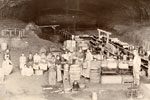
Cannery operation in the Ruskin Cave, Ruskin Cooperative Association Papers, 1896 |
Ruskin Cannery
Workers stand in front of Deep Lake, said to be bottomless. On the left is Dr. J.T. McDill, who became the keeper of Ruskin’s history. After the colony broke up he moved to Nashville, where he would serve as Tennessee’s Socialist Party. He also published the Ruskin Bugle, the homey, gossipy newspaper through which former Ruskin colonists kept in touch with one another. |
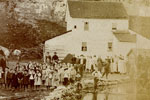
The Grist Mill at the mouth of the Ruskin Cave, Ruskin Cooperative Association Papers, 1897 |
Children at Ruskin
There were many children at Ruskin, and education was a significant part of everyone’s daily life. The Grist Mill, shown here, was part of the active commercial enterprise in operation by 1897. |
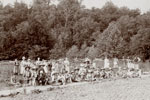
Strawberry Pickers, Ruskin Cooperative Association Papers, 1897 |
Strawberry Pickers
This photo shows a number of children and adults lined up on a road near a plowed field. Some of the children are holding baskets of fruit; several of the boys in the front row are holding up (or eating!) strawberries. Everyone worked at a variety of jobs, specializing in some skills, filling in other jobs as they were needed. |
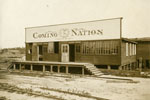
Coming Nation printing office, Ruskin Cooperative Association Papers, 1897 |
Coming Nation Printing Office
The Ruskin newspaper was devoted to “the Common Ownership of All Means of Production and Distribution.” By the beginning of 1895, the paper had 75,000 subscribers from all across the United States. |
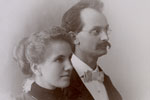 |
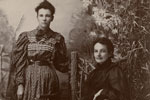
|
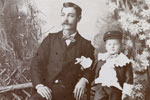 |
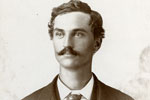 |
Dr. and Mrs. De Wolf in 1899. Dr. De Wolf became the baker in Ruskin. Faces of Ruskin, Ruskin Cooperative Association Papers, 1899 |
Mrs. Wilson and Mrs. Van Fleet. Faces of Ruskin, Ruskin Cooperative Association Papers, 1899 |
William Sickles and his son Cephus. Faces of Ruskin, Ruskin Cooperative Association Papers, 1899 |
Carlton B. Gordon, 27, the son of R.P. and D.R. Gordon. Faces of Ruskin, Ruskin Cooperative Association Papers, 1899 |
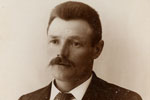 |
 |
 |
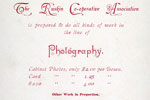 |
A member of the Ruskin "Printing Force." Faces of Ruskin, Ruskin Cooperative Association Papers, 1899 |
Unidentified Family. Faces of Ruskin, Ruskin Cooperative Association Papers, 1899 |
Unidentified Women. Faces of Ruskin, Ruskin Cooperative Association Papers, 1899 |
Unidentified Women, Back. Faces of Ruskin, Ruskin Cooperative Association Papers, 1899 |
 |
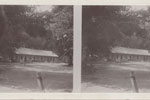 |
|
|
Unidentified Woman. Faces of Ruskin, Ruskin Cooperative Association Papers, 1899 |
Stereoview of the primary school at Ruskin, Ruskin Cooperative Association Papers, no date |
|
|
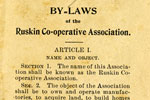
Ruskin By-Laws, Ruskin Cooperative Association Papers, 1897 |
Ruskin By-Laws
From the beginning of the Ruskin experiment, the colonists elected their leadership and followed the rules they had established for themselves. Among other things, all work was considered to be of equal value – commodities were priced according to hours of work (a pound of coffee cost seven hours; a pair of pants was valued at thirty-seven hours). Housing, food, medical care, and other necessities were provided without charge. |
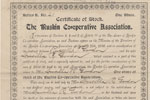
Certificate for Labor, Ruskin Cooperative Association Papers, no date |
Ruskin Certificate of Labor
The Ruskin Co-operative Association gave out certificates for labor – all work was of equal value – and the certificates could be exchanged for food and supplies. |
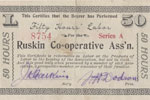
Certificate of Stock, Ruskin Cooperative Association Papers, 1899 |
Certificate of Stock - Front
The distribution of stock certificates, which originally went to both husband and wife, were eventually limited to the husbands. The controversy that followed the change eventually led to the break-up of the community. |
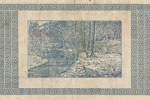
Certificate of Stock, Ruskin Cooperative Association Papers, 1899 |
Certificate of Stock - Back |
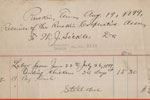
Financial Record, Ruskin Cooperative Association Papers, 1899 |
Ruskin Financial Record
Bookkeeping was detailed, complex, and occasionally amusing. |
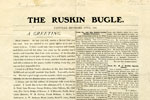 The Ruskin Bugle
The Ruskin Bugle, Ruskin Cooperative Association Papers, April 1906 |
Ruskin Bugle
This is an edition of the newspaper edited by J.T. McDill that kept Ruskinites in touch with one another after the colony broke up. |
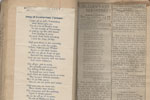
Eva Gordon's Scrapbook, Ruskin Cooperative Association Papers, no date |
Eva Gordon's Scrapbook
Eva Gordon wrote a popular column called “Our Children’s Department,” and she pasted all her published columns in a book that had been used to record coffee orders. The column, which promoted socialist values, also included poetry and letters from readers. |

